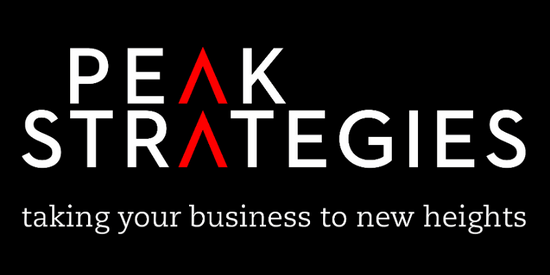Many years ago when I was starting Peak Strategies, I undertook a process that many other new business owners take when setting up a business, deciding on a name. Typical to my nature, I didn’t want the traditional accountant title of “John Thornett & Associates”. I wanted something that had meaning to me and what I wanted to achieve. At about the same time I had taken my family down to the Stirling Ranges. We have been there several times and it has to be my favourite place ever. It is stunningly beautiful, vast, unique, rugged, and full of wonder. Did you know the Stirling Ranges has more species of wildflowers than the entire British Isles? Incredible isn’t it? It’s a place where I feel at peace. As a family we have climbed Bluff Knoll several times and many of the other peaks (Hint…..).
12 awesome tips to prepare your retail pharmacy for 2016
 We all know that the giant supermarket chains spend millions of dollars on researching consumer behaviour. Nothing they do in the store is an accident. From the position of displays to the direction you walk around the store everything is planned to get you to buy more.
We all know that the giant supermarket chains spend millions of dollars on researching consumer behaviour. Nothing they do in the store is an accident. From the position of displays to the direction you walk around the store everything is planned to get you to buy more.
As a small retailer, you can learn from the big boys and use similar strategies to give your customers a good shopping experience encouraging them to buy more and, more importantly, come back. These 7 tips from marketing experts.
1. Make your shop windows shine
Ok, I know you're pressed for time, but vibrant window displays are vital.
Linda Cahan of Cahan & Co states that "many small retailers don't do window displays, letting customers simply look straight into the shop, and that's a mistake. As your eyes are the windows of your soul, store windows are the eyes of the shop." Each window should tell a story."
She suggests that small retailers create an appealing display
a. Use a single color theme to grab attention and communicate your store's image b. Avoid clutter because in retailing, space equals luxury. Items crammed together look cheap.
2. Make an arresting first impression
Slow your customers down with an eye-catching colourful display
Allow you the customer to see your shop. Notice how in Target you can see from one side of the store to the other. Shelves that customers can see over provides an unrestricted view of your store.
Avoid the mistake of many smaller retailers. Large shelving units near the front of the shop can block the view. If you have lower shelving units with short hooks and narrow shelves, then the store looks full with less stock. And that's a money saving strategy.
3. Steer customers to the right
Brian Dyches, chief experience officer of retail branding firm Ikonic Tonic in Los Angeles, reports that studies have shown that most people naturally look first left, then right as they enter a store and that shoppers usually then prefer to move right and walk counter-clockwise around the store. Via 7 Layout Secrets of the Big Retail Chains
4. Lead them somewhere
Do you have an isle that ends in a back wall? If you have, turn the wall into a compelling display and draw shoppers deeper into your store.
5. Have an angle
It may more efficient use of space to have the shelving units parallel to the shops exterior walls, but, if its possible angle the shelves to a central isle forming an arrow layout.
Only do this if you can keep the isles wide enough for your customers to get around easily.
What's their secret? Here are seven layout tips from experts who have worked with many major retailers.
6. Avoid long uninterrupted isles
Up to 20 percent of the store's merchandise is skipped over because long, uninterrupted isles don't get people's attention. So, if possible, create breaks and use them to grab people's attention.
7. Offer 'hugs.'
People are attracted to round and U-shapes, Dyches says. To get shoppers to stop at a display, try hanging a circular sign from the ceiling or placing a U-shaped background, such as a low wall with small sides extending forward, behind it. These make people want to stop and enter the space, which resembles a person extending their arms for a hug. Nordstrom makes great use of this technique in apparel displays, putting U-shaped partial walls behind mannequins on some displays, Dyches says. Source
Low-cost ways to improve your layout
2. Create a questionnaire and ask your employees and customers to give you feedback. 2. Hire a student from a local university to use your store as part of their research project 3. Find 2nd hand shop fittings to create displays in your store 4. Change displays regularly to maintain interest. Via 7 Layout Secrets of the Big Retail Chains
Now for 5 Habits of Success from Forbes.
Habit One: Prioritising is Key
Retailers are busy folks, with those not in the industry often misjudging just how much is on their to-do-lists. If you own a pharmacy, you already know that your list of tasks exceeds most other retail ventures.
With this in mind, successful retailers recognize the value in scheduling what is necessary to do and eliminating what is not. This also means recognizing that while some responsibilities are more enjoyable than others, all responsibilities must be prioritized to effectively run a successful retail business. Scheduling time limits and deadlines – even as your own boss – can help make retailers stay focused and on schedule, eliminating extra time spent where it shouldn’t be.
Habit Two: Letting go is a must
With a lot on a retailer’s to-do-list, who has time to dwell on the past? Sure, it’s easy to fall into this habit when mistakes are made, or opportunities are missed.
Retailers are bound to make poor inventory investments or have a slow month; however successful retailers analyze these situations as opportunities to learn from versus beat themselves up over.
One of the best ways to do this is lean on data... This often includes incorporating a point of sale (POS) system, using social media monitoring software and tracking customer loyalty. The more retailers know through hard data, the better they are in supporting their customers.
Habit Three: Staff training is vital
Stores spend a lot of money to open their doors and keep them open, which is why it always surprises me when a sales associate has no idea how to support the customers in their store.
The people of any business are the faces of that brand… whether they want to accept that role or not. As employers, it’s important to understand this reality and train associates to best represent their stores. Retailers who successfully run their businesses recognize the value in their associates and not only train them, but train them often.
The key is to invest time and dollars into your employees to reap the rewards of strong associates and as a result, healthy sales.
Habit Four: Knowing the competition is a priority
Know your competitors. Whether it’s your big box competitors or your local Main Street stores, successful merchants know who their competition is. And while it would be easy to simply read about their competition, savvy retailers take the time to actually visit the stores that compete with their business.
The following 7 points are a few of the main points savvy retailers analyse
1. What is their product assortment like? 2. What is the customer experience like? 3. What are their displays like? Can you learn from them? 4. Are they taking advantage of online shopping opportunities? 5. Do they have special events? 6. What is their dress code? 7. What is their customer service like?
Often, this type of routine analysis allows retailers to recognize new industry trends, missed opportunities, new strategies to compete for sales and other ways to stay afloat in the competitive retail marketplace.
Habit five: Shifting store inventory is "Okay".
Merchants who have become successful and more importantly, stayed successful, are willing to shift their inventory plans to accommodate their customers versus themselves.
When merchants listen to their customers, react to consumer trends, work with their vendors and respond to what their customers want, they can more efficiently buy inventory for their stores. Click to read the full article
Find an advisor specialising in the pharmacutical industry to safely help you grow your business
Because Peak Strategies specialise in the Pharmacy and Medical Industries we are uniquely placed to provide you with accurate industry specific data to help you grow your business.
Email or call John Thornett on 9315 3117 to find out how we can help you grow your pharmacuy business. for an appraisal of your pharmacy and how you can expand and improve sales.
Like what you're reading? Subscribe to our blog.
How to relieve Stress: 7 real benefits of taking a holiday. (And Why Holidays Are Essential for Pharmacy Owners)
Owning a business comes with stress and often tiredness. Pharmacy owners most certainly can relate. That is why I took the time to research the benefits of taking a holiday. (So you then really have no excuse).
A lesson learned by 2 business owners.

"I was 35 and fast approaching burnout. Too much unrelieved stressed, too much to do and no time to do it all. I was too busy for my good, and I didn’t have time for a holiday.
My wife and I were having dinner with close friends who also owned and operated their businesses. We talked about how tired we were and how we didn’t have time for a holiday. We decided that we needed a break.
The next day I went to a travel agent and booked and purchased four tickets to Honk Kong for ten days. I then called my friend telling him the dates we would be travelling and that he owed me for the airfare and accommodation. I didn’t leave us with any wriggle room."
That was 30 years ago, and our businesses survived. Alan Cox Perth Western Australia
The importance of holidays and stress reduction can't be underestimated
The importance of holidays is undeniable because it gives your mind a chance to declutter and, with the right sort of holiday, reduce your stress.
Elizabeth Scott, a stress management expert, has this to say.
"Letting stress build up can be unhealthy in several ways. The body is designed to respond to short bursts of stress but prolonged when stress is prolonged; the stress response is triggered on a regular basis -- as can happen in a stressful job or a conflict-ridden relationship --the situation turns into one of chronic stress, where the real health problems set in.
When our allostatic load, or overall level of stress, accumulates to a certain level, stress can just snowball because we're constantly in a state of reactivity. At this point, even positive events can feel overwhelming if they take energy to enjoy, and we're not able to respond from a place of strength and wisdom, but rather from a place of anxiety, or we work on auto-pilot. "
http://stress.about.com/od/funandgames/a/Why-You-Should-Take-A-Break.htm
It doesn’t need to be a long break
Vacations and even shorter breaks where we get some physical and psychological ‘space' from the demands of life can bring many rewards.
Obviously, we feel less stress when we're not in a stressful environment. But vacations bring more than that: they interrupt the cycle of stress that can lead to overwhelm.
"Holidays give us a break from chronic stress so we can restore ourselves physically and mentally to a healthier place.

Because a chronically-triggered stress response can lead to decreased creativity, memory problems, mild cognitive impairment and other issues, this break in the stress cycle can lead to sharper thinking and increased creativity that can spill into all areas of our lives.
Regular breaks make us better at our jobs, more available in our relationships, more energetic with our families, and more able to enjoy life for a prolonged amount of time after we return. "
http://stress.about.com/od/funandgames/a/Why-You-Should-Take-A-Break.htm
The 7 very real and proven benefits of taking a Holiday:
- Holidays promote creative thinking
- Stave off burnout
- Keep you healthy
- Strengthen relationships
- Improve your job performance
- Relieve stress in a way that lasts
- Leave you refreshed and ready for action
The bottom line
The bottom line is that taking a good amount of time away from the stresses of daily life can give us the break we need so that we can return to our lives refreshed and better equipped to handle whatever comes.
Susan Krauss Whitbourne Ph.D
"Chronic stress takes its toll in part on our body's ability to resist infection, maintain vital functions, and even ability to avoid injury. When you're stressed out and tired, you are more likely to become ill, your arteries take a beating, and you're more likely to have an accident. Your sleep will suffer, you won't digest your food as well, and even the genetic material in the cells of your body may start to become altered in a bad way. Mentally, not only do you become more irritable, depressed, and anxious, but your memory will become worse, and you'll make poorer decisions. You'll also be less fun to be with, causing you to become more isolated, lonely, and depressed."
https://www.psychologytoday.com/blog/fulfillment-any-age/201006/the-importance-vacations-our-physical-and-mental-health
The business case for having a holiday
Many (if not most) business owners find it difficult to find the ‘right’ time to take a holiday.
Pamela Murray-Jones, a business coach, specialising in strategy, leadership and organisational wellbeing, says planning properly for taking a break is the key to making it work for business owners.
"I sometimes see business owners who think of a holiday for themselves as 'money lost'. You need to build your holiday into your income structure, just as you do for any employee salary package," she explains. "And if you time it around your quietest period, you'll find it a lot easier to enjoy the time off."
http://www.macquarie.com/au/business-banking/business-management/expertise/work-life-balance-tips
Holidays lead to greater productivity
Not only are you more productive after a break, but holidays also make you more focused in the lead-up because you have a deadline to work to.
Finding the right balance
"Glen Peterson, Director at LJ Hooker Commercial Parramatta and Blacktown believes it's critical for business owners and their staff to take a break, to stay fresh and get some balance in their lives."
He goes on to say that it may not be an overseas holiday but time spent at home with the kids enjoying some activities with them.
You get a new perspective on your business
One of the recurring themes in this article is the benefit of insights.
"Big problems don't get solved while you're busy running the day-to-day of your business," says Murray-Jones. "You need to take the time to reflect and learn. Holidays give you great thinking time, allowing you to free your mind of the smaller day-to-day operational details, phone calls and emails so you can reflect on some of the bigger issues you're dealing with."
In a 2006 Ernst & Young research study, the firm found that for every extra 10 hours of holiday its employees took, average annual performance ratings rose eight per cent.
Murray-Jones believes the key is achieving a balanced state of mind, so you are in the best position to navigate life's professional and personal ups and downs.
“Work is part of your life. So are a lot of other things – health, relationships and family. You need to look at the whole circle. It's not just work on one side, life on the other. The balance is in your mind – if you're not overwhelmed, you can be more focused in all aspects of your life." http://www.macquarie.com/au/business-banking/business-management/expertise/work-life-balance-tips
Are you going to take a holiday?
If you are planning to take a holiday make sure that it isn’t jammed pack with too much tourism activity, time spent in endless lines and security checks at airports, checking into hotels and strewams of heavy traffic.
Have a fun holiday
Instead spent plenty of time having fun with your family, walk on the beach and watch the sunset, feel the sand between your toes enjoying life then you can reap the benefits of looking and feeling younger, increased productivity, longer life, and happier relationships at home and work.
Short breaks help too
Canadian researchers Joudrey and Wallace studied a sample of 900 lawyers and found active leisure pursuits such as golf or surfing help to buffer job stress. It's understood that taking a holiday gives you a better life perspective and motivates you to achieve your goals. However, a Netherlands study showed there is no happiness gain after a holiday if there was moderate to high travel-related stress, such as long airport delays and traffic jams. http://www.macquarie.com/au/business-banking/business-management/expertise/work-life-balance-tips
So, if you want to make better decisions, increase your ability to solve problems and ‘think outside the box’ then you really need to take a holiday - regularly.
You already know that some stress is good for you. It is what makes the world go around.
Too much stress?
But, while some stress is important for your survival and ability to perform on a daily basis, too much stress prevents you from being able to think clearly and creatively and it does prevent good decision making.
Too much stress leads to poor decisions, poor problem-solving ability, relationship breakdown and poor health. All of which will end up costing you heaps of money.
The benefits of taking regular short breaks and a longer holiday are indisputable. As in all things, the decision is yours.
As a reminder here are the 7 very real and proven benefits of taking a Holiday:
- Promote creative thinking
- Stave off burnout
- Keep you healthy
- Strengthen relationships
- Improve your job performance
- Relieve stress in way that lasts
- Leave you refreshed and ready for action
One simple principle that is the key to motivating your staff (And improving your customer service at the same time)
Do customers in your pharmacy have this experience?
I walked into a pharmacy looking for a specific product and I approached the counter.
The Pharmacist and a staff member were standing at the counter discussing a document. They didn’t even look up.
I stood at the counter and waited. Then I wandered around the shop before returning to the counter and waited some more. Ignored, I left the store.
Do you own a pharmacy or two and want to grow your business?
The most dominant companies to emerge from the past decade's tech boom have proven that healthy growth is all about scaling. By adopting a scalable business model, these firms have generated huge profits without all the budgetary strains that plague traditional growth models.
A replicable system for delivering goods and services allows businesses to increase their customer base without having to increase their overhead at the same pace.
By contrast, the traditional growth model has fostered a vicious cycle of inefficiency--a company gains a few new clients, so they hire more people to service those clients, adding costs at nearly the same rate that they're adding revenue.


